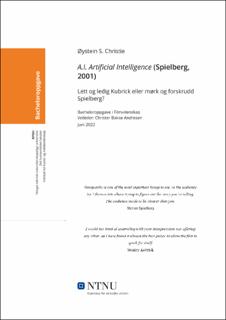| dc.contributor.advisor | Andresen, Christer Bakke | |
| dc.contributor.author | Christie, Øystein Soknes | |
| dc.date.accessioned | 2022-07-07T17:21:29Z | |
| dc.date.available | 2022-07-07T17:21:29Z | |
| dc.date.issued | 2022 | |
| dc.identifier | no.ntnu:inspera:104821360:37143513 | |
| dc.identifier.uri | https://hdl.handle.net/11250/3003666 | |
| dc.description.abstract | Denne oppgaven ser nærmere på filmen A.I. Artificial Intelligence (2001), som ble konseptualisert av Stanley Kubrick, men regissert av Steven Spielberg etter Kubricks død. Jeg spør hvordan de to filmskapernes høyst særegne stiler samhandler i denne filmen; hvordan komplimenterer og/eller motvirker de hverandre, og hva blir resultatet? Hva går tapt og hva vinner filmen gjennom denne hybriden? Ved å trekke fra diverse filmteoretikere – blant andre Murray Smith, Greg M. Smith, Margrethe Bruun Vaage og Carl Plantinga – argumenterer jeg for at Kubrick i langt større grad enn Spielberg er tilbøyelig til å utforske moralske gråsoner og yttergrensene for emosjonelt engasjement i filmene sine. I A.I. observerer jeg at Spielberg «presses» til å ta mer aktiv stilling til filmens iboende samfunnskritikk og moralfilosofiske spørsmål enn hva man er vant til å se fra ham, men at den fortsatt er betydelig mindre kompleks og mer sentimental enn andre Kubrick-filmer. Oppgaven beskriver også noen mulige forklaringer på hvorfor Kubrick selv ville ha inn Spielberg som regissør; Spielberg ville kunne øke filmens kommersielle potensiale betraktelig, og han ville også kunne lage en barnlig eventyrfilm med et sterkere emosjonelt engasjement enn det Kubrick trolig kunne klart selv.
Nøkkelord: Stanley Kubrick, Steven Spielberg, sympatistruktur, emosjonelt engasjement, sentimentalitet, samfunnskritikk, moralfilosofi. | |
| dc.description.abstract | This paper examines the film A.I. Artificial Intelligence (2001), which was conceptualized by Stanley Kubrick, but directed by Steven Spielberg after Kubrick’s death. I ask how the two filmmakers’ highly distinct styles interact in this film; how do the two complement and/or counteract each other, and what is the result? What is lost and what is won in this hybrid? Drawing on various film scholars – among others Murray Smith, Greg M. Smith, Margrethe Bruun Vaage and Carl Plantinga – I argue that Kubrick, to a far bigger degree than Spielberg, is willing to explore moral gray-areas and the outer limits of emotional engagement. For A.I., I observe that Spielberg is “pushed” into a more active stance on the film’s inherent social criticism and moral philosophical questions than viewers have come to expect from him, but that it is still considerably less complex and more sentimental than other Kubrick-films. The paper also describes some potential reasons for why Kubrick himself wanted Spielberg to direct the film; that Spielberg would drastically increase the film’s financial potential, and that he would be able to make a film about a child’s adventure in a more deeply engaging manner than what Kubrick could likely have made himself.
Keywords: Stanley Kubrick, Steven Spielberg, structure of sympathy, emotional engagement, sentimentality, social criticism, moral philosophy. | |
| dc.language | nob | |
| dc.publisher | NTNU | |
| dc.title | A.I. Artificial Intelligence (Spielberg, 2001): Lett og ledig Kubrick eller mørk og forskrudd Spielberg? | |
| dc.type | Bachelor thesis | |
